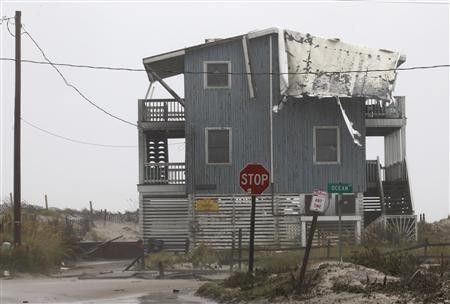New York Shuts Down Ahead of Hurricane Irene

The city that never sleeps started shutting down at midday on Saturday, with nearly all businesses except a smattering of food and liquor stores closing and public transportation coming to a halt ahead of Hurricane Irene.
With the 530 mile-wide storm moving up the East Coast unleashing winds of 85 miles per hour and due to hit New York City late on Saturday or early Sunday, Mayor Michael Bloomberg ordered an unprecedented evacuation of 370,000 people from low-lying areas.
But many appeared to defy the evacuation order. Only 1,400 people had checked into emergency shelters, and an unknown number chose instead to stay with family and friends outside the evacuation zone, Bloomberg said.
Despite the persistent warnings and ominous skies, the neighborhood around Brooklyn's Coney Island -- within the danger zone -- was calm. Parked cars lined the streets, and there was no sign of a mass exodus.
They are right, we should be evacuating, but we are not, said John Visconti, 47, who owns an auto repair business and lives on the ground floor of his building in the nearby Brighton Beach area of Brooklyn. We just want to stay home and hope for the best. We should be OK.
The evacuation zones included shiny apartment buildings in Manhattan's wealthy Battery Park City, working class Red Hook in Brooklyn and run-down public housing in Coney Island -- all neighborhoods at the water's edge.
If the neighborhood is eventually legitimately flooded, I have food and books and whiskey, said attorney Neal D'Amato, 31, who ignored Bloomberg's pleas on the TV set on a shelf above him while sipping a beer at the Red Hook Bait and Tackle shop bar.
He said he would ride out the storm in his fourth-floor apartment.
A public transit system that moves 8.5 million people per weekday shut down as a precaution, another first that left commuters to flag down yellow taxis and livery cabs that were patrolling largely deserted streets.
The network of 468 subway stations, 324 bus routes and two commuter rail lines was unlikely to be functioning when Monday morning's commute begins, Bloomberg said, and electricity in lower Manhattan including Wall Street could be out for days should the utility Consolidated Edison decide to preemptively shut off power.
The New York Stock Exchange expects a normal trading session on Monday.
One of the danger zones, the Financial District surrounding Wall Street was largely deserted, with clusters of pedestrians with suitcases hailing cabs to get to higher ground.
This is going to be a very serious storm, no matter what the track is, no matter how much it weakens. This is a life-threatening storm to people here, Bloomberg said.
Staying behind is dangerous, staying behind is foolish and it's against the law.
PLASTIC SHEETS AND SANDBAGS
Outside the W Hotel near the World Trade Center site of the September 11 attacks, Tamara Steil, 57, who is visiting from Michigan, waited for a hotel shuttle to take her to a midtown Manhattan hotel.
We were here to spend money on restaurants and bars, but all these places are closed, she said, as she shared a pack of beer with other stragglers.
The South Street Seaport, which on a typical summer Saturday would be full of tourists, was nearly abandoned, the storefronts and restaurants boarded up or covered in plastic sheets, sandbags protecting the doors.
At the New Zealand Bar and Grille, co-owners Michelle Noble-Cassano and Diane Honeywell recruited a group of visiting firefighters from Canada, offering food and beer in exchange for their help taping shut windows before closing.
At a Manhattan Whole Foods -- which stayed open all night on Friday -- the check-out lines extended across the store as scores of people stocked up on water, canned foods and other items, before finally closing at 10 a.m. on Saturday.
I was a little surprised that they're closing the MTA (public transportation), especially since so many people depend on it, said Jacob Varghese, 34, who bought canned food to take home.
At a Home Depot store in Manhattan, store clerks said they planned to stay open throughout the storm, but early on Saturday it had already run out of flashlights, duct tape, rope and tarps.
The greatest danger to New Yorkers was a potential tidal surge, the mayor said. Residents should prepare for power outages and flooding, he added.
This is not a joke. Your life could be in danger, he said. It isn't cute to sit there and say, 'I'm tougher than any storm.' They don't know what they're talking about.
© Copyright Thomson Reuters 2024. All rights reserved.





















